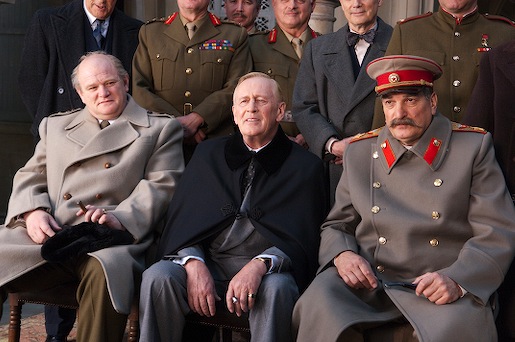HBO's Churchill sequel wades into WWII
05/29/09 08:22 AM

By ED BARK
Built like Humpty Dumpty but refusing to crack, Winston Churchill smoke, drank and drove his country through the darkest days of World War II.
His gruff private demeanor and soaring public rhetoric get another going-over in HBO's Into the Storm (Sunday, May 31st, 8 p.m. central), a followup to the network's 2002 scene-setter, The Gathering Storm.
This one is something of a markdown, marquee wise at least. Albert Finney and Vanessa Redgrave played Churchill and his wife, Clemmie, in the first film, which won the Emmy as best made-for-TV movie. Brendan Gleeson and Janet McTeer are the principals this time out. That's not to say they're lesser actors, although this is a lesser film.
It begins in July, 1945, with the Churchills fitfully on holiday in France while awaiting Britain's post-war parliamentary elections. Will Churchill be re-approved as prime minister or be done in by the opposition Labor Party? The movie then seesaws back and forth between the war years and the waiting game in France. Beset by Hitler's onrushing Nazi forces, Churchill is steadfastly determined to go down fighting if necessary rather than cave in like the accommodating French. As he tells Clemmie, "Bloody French. They're less than useless."
Into the Storm also depicts the like-minded alliance between Churchill and President Franklin D. Roosevelt (Len Cariou), which ripened in full when Japan attacked Pearl Harbor and forced the U.S. to throw all of its might into the Allied effort.
"Tonight I shall sleep the sleep of the saved and thankful," Churchill tells an aide after getting the news.
Gleeson is more than serviceable as Churchill and McTeer is quietly effective as his oft put-upon wife. Cariou is a less than dynamic FDR, though, while Soviet dictator Josef Stalin (Alexy Petrenko) barely registers during their three-way gathering at the Yalta Conference. In the end, Into the Storm is instructive and interesting without being rousing or truly memorable. Instead it's rather programmatic, including the telegraphed bittersweet ending.
This should be said, though. HBO is the only current-day network with any interest in bankrolling such a film. It still aspires to make movies of worth that don't necessarily appeal to a "younger demographic." Teens and young adults won't be watching this unless they're later forced to do so in a history class.
Meanwhile, HBO subscribers of a certain age can appreciate both the topic and the heroics of those days, even if Into the Storm falls a bit short on crackle and pop.
GRADE: B
